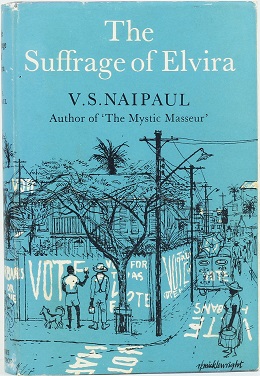
To prep for (hopefully) tonight’s grand finale, when Brooklynites and whoever else lives in America will cast their votes for state and national candidates, Vol. 1 Brooklyn presents part two of Frontrunners: a short series examining novels about elections and their entrants. May these profiles both rally citizens and celebrate the sensual art of civics itself. With any luck, the “absentee ballads” vetted here might even find their way to President Obama and Governor Sideburns, and offer both men solace and inspiration in the exhausting days to come.
TODAY’S ADVENTURE: The Suffrage of Elvira by V.S. Naipaul (Penguin, 1958).
PARTY PLATFORM: Looking to nab new construction deals, Trinidadian engineer Surujpat Harbans—aging, surly, weepy, and wealthy—runs for Legislative Council in the diverse but crumbling district of Elvira. Harbans assembles a team of rivals whom he hopes will pin down the electorate’s divided camps. His crew is run by Chittaranjan the goldsmith, who promises to lock down Elvira’s Hindu voters if Harbans’ son will marry his daughter Nelly, and Muslim kingpin Baksh the tailor, whose son Foam has his sights set on both Nelly and a cushy gig as Harbans’ campaign manager. Standing in the way of victory are Harbans’ opponent Preacher Thomas—popular, stoic, and black—and Preacher’s verbose, William Saroyan-loving hype-man Lookhoor. Harbans employs endless bribes and countless backroom shenanigans, not to mention his posse’s shadeball efforts to spook the Spanish immigrants from voting altogether, to rally Elvira’s fair citizens to his side. In time, both campaigns grow distracted by the fate of a family of cute puppies, forecasting the effects of Reddit by half a century.
LESSONS WITHIN FOR PRESIDENT OBAMA: The “You didn’t build that” theory of civic works seamlessly when you’re the dude slapping down the tar and pavement. Much as Barack Hussein’s handle was deemed suspect by ugly Americans, Preacher too is lambasted for his supposedly curious middle name, Anaclitus.
GUIDANCE FOR GOVERNOR ROMNEY: Harbans opens a large bar tab on behalf of patrons of Elvira’s favorite rum tavern. Buying a round of drinks now and again is a cajoling technique potentially at the president’s disposal, but not likely to be employed by the abstinent Romney. Like the governor, Harbans panders to doom-prophet Bible-thumpers, who in his case profess that Armageddon will arrive some time in 1976.
SWAYING THE UNDECIDED VOTER: When Harbans pays for a deceased man’s funeral to gain favor with Muslims, an obit plays over the radio, championing Harbans’ generosity in between ads for Ponds cream, Colgate toothpaste, and beer. He later suggests that there should be laws which limit the amount a candidate can spend campaigning, an idea quickly laughed off by his cronies. And in an eerie echo of the dilemma posed by Sandy, a member of Harbans’ team who has just paid off every cabbie in town tells him, “The thing to make sure you win now, is rain. Rain going to keep back all those people who going to vote for Preacher. Preacher ain’t got cars to take them to the polling station. We got all the cars.”
EXIT POLL: Like today’s shootout, the election detailed in Elvira is won and lost via an increasingly diverse constituency. Even if the parallels were not as vivid, the book would still be a funny, crackerjack yarn that expands our grasp of Naipaul, whose questionable opinions of women, minorities, and colonialism have come under fire in recent years. In this, his second novel penned when he was still in his mid-twenties, Naipaul’s women are fiery scholars and matriarchs who rule the roost and mock their bumbling husbands’ grasps at power while rightly predicting of their fiasco campaign that “for all it begin sweet, it going to end damn sour.” Likewise, it is Elvira’s biggest rube who pronounces: “This democracy, I say it just made for Negro and Muslim.” Across cultural divides, both candidates are perpetually looking for that elusive charisma that will sell them as masters of the personal, or as Naipaul writes in his rendering of the local tongue, “pussonal.” The Suffrage of Elvira is as much a satire of male insecurities as it is of local politics; in one of the book’s many epic burns, Baksh sarcastically tells Foam, “You is a big man. Your pee making froth.”
Now then, in the name of all that is decent, even if you live in true blue Brooklyn: go vote. Suffrage is a hard-fought right, and casting your ballot truly is, as branded by one young woman recently interviewed by Errol Morris, “a cheap thrill.”
Previously on Frontrunners: Philip Roth’s Our Gang.

1 comment